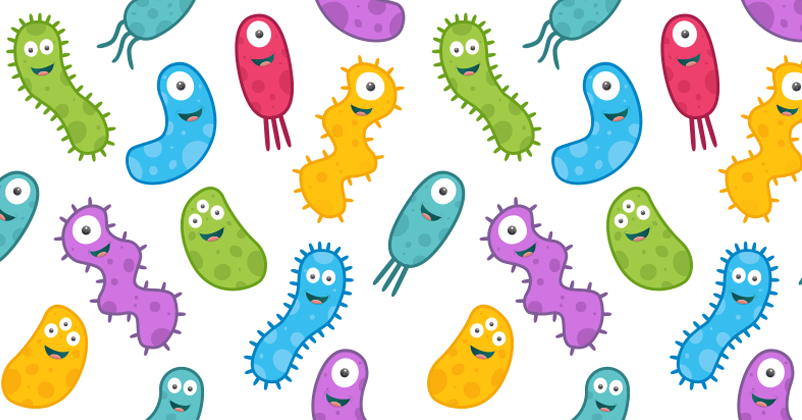
Most of us grew up with the idea that all germs are bad—but now, researchers are learning that the microscopic organisms making their home on and in your body are mostly very, very good for you.
Centuries ago, Hippocrates (the father of Western medicine) said that “all disease begins in the gut.” Today, it’s “all health begins in the gut.” The bacteria themselves are called the gut microbiota and their DNA is called the microbiome, though the terms are often used interchangeably. Whatever you call them, the bacterial community inside you actually enables your health throughout your life. So if your microbiota isn’t happy, you can’t be truly healthy.
You’re As Much Microbe As Human
The gut microbiota is, collectively, trillions of symbiotic and pathogenic microorganisms found in and on the human body, and it’s crucial to the balanced metabolic functioning of its host...that is, you.
You’re as much microbe as human: Scientists estimate that there are at least as many bacteria in your body as human cells, and as much as 100 times more bacterial DNA (the “microbiome”) than human DNA. That’s just under half a pound of microbes, located mostly in your gut—and two-thirds of them are as unique to you as your fingerprint.
As author and food activist Michael Pollan says, “Human health should now ‘be thought of as a collective property of the human-associated microbiota‚’—that is, as a function of the community, not the individual.”
Four Reasons to Listen to Your Gut
You’re first exposed to your mother’s microbiota during birth (maybe earlier, say some researchers); then, during very early childhood, you quickly develop a microbiota of your own. It continues to evolve throughout your life in response to food and environment.
A child who’s exposed to a varied environment—pets, people, novel foods, plenty of time outdoors—develops a gut community that’s diverse, balanced, and robust. By contrast, the “hygiene hypothesis” suggests that children who don’t get that kind of exposure end up with imbalanced gut bacteria, resulting in a wide range of potential health problems, including allergies and asthma.
The gut microbiota has evolved a complex union with the central nervous system and exerts a profound effect on the rest of the body—so much that it’s often called a “second brain.” It governs or moderates 4 key areas of your health:
-
Nutrition: Gut bacteria extract and absorb nutrients from food; without them, you couldn’t digest molecules like plant cellulose. Researchers say that the diversity of your microbiota is related to the diversity of your diet—and the diversity of your microbiota is an indicator of overall health.
-
Immunity: The microbiota educates the immune system about the outside world; without it, that adaptive (learned) immunity wouldn’t exist. You couldn’t be immunized against diseases like polio or measles, and your body couldn’t mount a rapid defense against disease-causing organisms.
-
Behavior: Research has shown that the microbiota influences neural development, brain chemistry, and a wide range of behaviors—including emotions, perception of pain, stress response, sleep cycles, some cognitive functions, anxiety, and depression.
-
Disease: A healthy microbiota maintains the intestinal barrier (which defends the body from ingested pathogens) and resists the overgrowth of harmful bacteria. Low diversity or imbalance in the microbiota is linked to obesity, type 2 diabetes, heart disease, irritable bowel syndrome, Crohn’s disease, autoimmune diseases, anxiety disorders, and some cancers.
How to Keep Your Microbiota Happy
From the beginning, your gut microbiota is shaped by diet and environment as it works to keep you healthy. Make choices to support your resident bacteria, and you’ll support your overall health at the same time.
-
Eat a balanced, fiber-rich diet with a variety of whole foods, including lots of fermented foods and fresh produce. Diet is one of the most powerful ways to support diverse, robust gut microbes; prebiotic and probiotic supplements can also support a balanced gut population.
-
Stay active and exercise regularly. It’s good for your whole body and mind.
-
Steer clear of “antimicrobial” products. These items act indiscriminately against both “good” and “bad” bacteria, damaging your immunity and your microbial community.
-
Don’t drink a lot of alcohol. Alcohol kills the beneficial bacteria in your gut, reduces nutrient absorption, and can trigger inflammation.
-
Actively manage your stress. Long-term stress reduces blood flow to the digestive tract and causes poor digestion (plus a host of other problems you don’t need).
-
Avoid unnecessary antibiotics, which devastate your microbiota. If you take daily medications, focus on a gut-healthy diet to replenish the good bacteria and nutrients that medications may destroy.
Paying attention to supporting, reinforcing, and balancing your gut microbiota can help you maintain good health throughout your life. When your microbiota is happy, you can be truly healthy, too.
Resources
There’s so much to discover about the gut microbiome—it’s an incredibly intense, interesting, and deep topic. Check out the resources that we tapped for this article and enjoy!
Honor Whiteman, “The Gut Microbiome: How Does It Affect Our Health?” Mar. 11, 2015. Accessed May 3, 2017.
James Colquhoun, “7 Habits Harming Your Gut Health,” FoodMatters.com, Apr. 8, 2017. Accessed May 4, 2017.
Jenna Birch, “5 Facts that Will Convince You to Actually Care about Your Gut Bacteria,” Self.com, May 12, 2016. Accessed May 4, 2017.
Katherine Harmon Courage, “Fiber-Famished Gut Microbes Linked to Poor Health,” ScientificAmerican.com, Mar. 23, 2015. Accessed May 3, 2017.
Markus MacGill, “What is the gut microbiota? What is the human microbiome?” MedicalNewsToday.com, Mar. 24, 2016. Accessed May 3, 2017.
Michael Pollan, “Some of My Best Friends Are Germs,” NYTimes.com, May 15, 2013. Accessed May 3, 2017.
Rachael Rettner, “5 Ways Gut Bacteria Affect Your Health,” LiveScience.com, Sep. 5, 2013. Accessed May 4, 2017.
Raphael Kellman, MD, “15 Tips to Take Care of Your Microbiome,” MindBodyGreen.com, Aug. 14, 2014. Accessed May 4, 2017.
Rob Knight, “How Microbes Define, Shape—and Might Even Heal Us,” Ideas.TED.com, Apr. 7, 2015. Accessed May 8, 2017.
Rob Knight, “How Our Microbes Make Us Who We Are,” TED Talks, TED.com, Feb 2014. Accessed May 23, 2017.
Ron Sender, et al., "Revised Estimates for the Number of Human and Bacteria Cells in the Body," PLOS Biology, via the US National Library of Medicine, National Institutes of Health, Aug. 19, 2016. Accessed Jun. 16, 2017.
Dr. Siri Carpenter, “That Gut Feeling,” American Psychological Association Monitor on Psychology, APA.org, Sep 2012. Accessed May 18, 2017.
WebMD, “What Your Gut Bacteria Say About You,” Mar. 15, 2016. Accessed May 23, 2017.
Wikipedia, “Microbiota,” last edited May 22, 2017. Accessed May 22, 2017.









